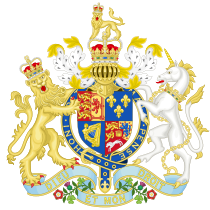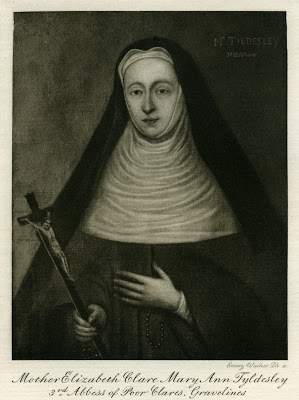Elizabeth Tyldesley (1585–1654) was a 17th-century abbess at the Poor Clare Convent at GravelinesConvent in the Spanish Netherlands (now in northern France), founded in 1607 by Mary Ward, a community of English nuns of the Order of St Clare. Commonly called the Poor Clares..
Elizabeth Tyldesley was born in 1585, her father was Thomas Tyldesley of Morleys Hall
Morleys Hall, a moated hall converted into two houses on the edge of Astley Moss in Astley, Greater Manchester, England, was largely rebuilt in the 19th century on the site of a medieval timber house. in Astley and Myerscough Hall and her mother was Elizabeth Anderton of Lostock in Lancashire (now Greater Manchester). Her family were recusants
One of the Acts of Parliament collectively known as the Elizabethan Religious Settlement. It introduced a Common Book of Prayer, and obliged everyone to attend their parish church every Sunday and on holy days. Those who refused were known as recusants., and her mother arranged a pension for the Catholic priest, Ambrose Barlow, so that he could secretly carry out priestly duties, offering mass in the homes of Catholics in the Leigh parishAncient or ancient ecclesiastical parishes encompassed groups of villages and hamlets and their adjacent lands, over which a clergyman had jurisdiction.. Her grandfather, Edward Tyldesley, left her a dowry of £500, but she never married.[1]
Instead Elizabeth joined the English community of nuns of the Order of St Clare, (then called “Claresses”), at Gravelines, which was at that time part of the Spanish Netherlands.[1] The convent at Gravelines was a religious community founded in 1607 by Mary Ward for English Roman Catholic women who wished to live the contemplative life of a nun, which was impossible after the Reformation and the Dissolution of the Monasteries in England.
Elizabeth was one of seven candidates who received their religious habits on 5 February 1609 when she also assumed the name of Sister Clare Mary Ann. She completed her novitiate year and professed her first vows on 3 November 1610.[2] The way of life of the Poor Clares was austere: the nuns slept on straw sacks, ate meat only at Christmas and spent much of their day in silent prayer or contemplation, speaking only when necessary and with permission.[3]
Five years later, she was elected abbess of the community. Previous incumbents of the office had struggled with financial difficulties, but under Mother Clare Mary Ann the establishment flourished.[4] In 1626 the Jesuit influence over the nuns was challenged by English Franciscans, who claimed authority over the convent and deposed Abbess Elizabeth Tyldesley, replacing her with Margaret Radcliffe. A period of “civil war” divided the cloisterCovered walkway usually set out in the form of a square.; one nun, Elizabeth Evelinge [a]Catherine of St. Magdalen, helped the Franciscans with publications and translations, but most objected to the removal of Tyldesley. Eleven nuns, including Evelinge, who supported the Franciscan spiritual direction, moved to establish a new convent at Aire in 1629.[5]
Tyldesley became superior of four communities of Poor Clares, both Irish and English, and received more than a hundred women into religious life. [2] She died on 17 February 1654 after 44 years in the convent, of which she had served as abbess for 39.[1]
Elizabeth’s nephew, the Cavalier and Catholic Sir Thomas Tyldesley, considered to be “one of the wealthiest gentlemen in Lancashire”, must have been proud of his aunt’s achievements, according to historian Gordon Blackwood.[6]

